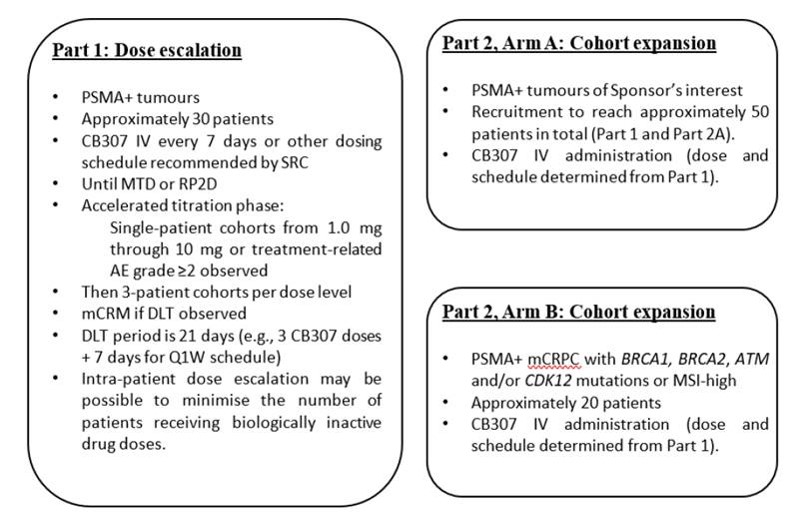POTENTIA
A Phase 1 Open-Label, Dose Escalation and Expansion Trial to Investigate the Safety, Pharmacokinetics and Pharmacodynamics of CB307, a Trispecific Humabody® T-cell Enhancer, in Patients with PSMA+ Advanced and/or Metastatic Solid Tumours
Enrollment
Recruiting
No. of patients
0 / 70
Population
Patients aged ≥18 years with a histologically confirmed diagnosis of PSMA+ advanced and/or metastatic solid tumours who are not amenable to standard of care treatment
Design
This is a FIH, Phase 1, open-label, multi-centre, non-randomised study. The study will consist of a dose escalation phase (Part 1) and a cohort expansion phase (Part 2).
Part 2 comprises two arms, Part 2A and Part 2B and will be initiated after the MTD/preliminary RP2D dose decision. After determination of preliminary RP2D for use in Part 2, a different dose level in Part 1 may remain open in order to further inform the dose optimisation decision.

Key outcome parameters
To assess the safety and tolerability and determine the MTD and the preliminary RP2D of CB307 in patients with PSMA+ tumours
Intervention
CB307, a Trispecific Humabody® T-cell Enhancer
Key inclusion criteria
Inclusion criteria
- Histologically confirmed diagnosis of advanced solid tumours, not amendable for standard care
- PSMA positivity
- Has radiologically measurable and clinically evaluable disease per RECIST v1.1
- Has an Eastern Cooperative Oncology Group Performance Status ≤2
- All acute toxic effects of any prior radiotherapy, chemotherapy or surgical procedure must have resolved ≤grade 1, except alopecia (any grade) and ≤grade 2 peripheral neuropathy
- Has adequate haematological function
- Adequate liver and renal organ function
Key exclusion criteria
Exclusion criteria
- Evidence of autoimmune or significant, uncontrolled concomitant diseases that could affect compliance with the protocol or interpretation of results
- Discontination from anti-cytotoxic lymphocyte-associated protein 4, anti-PD1 or anti-PD-L1 antibody because of intolerable toxicity
- Brain metastasis
- Encephalitis, meningitis, or uncontrolled seizures in the year prior to informed consent
- Current or history of CNS disease that could potentially complicate the assessment of immune effector cell-associated neurotoxicity syndrome (ICANS)
- Uncontrolled pleural effusion, pericardial effusion or ascites
- Currently receiving bisphosphonate therapy for symptomatic hypercalcaemia
- Active second malignancy
- Significant cardiovascular/cerebrovascular vascular disease within 6 months prior to the first dose of CB307
- Known HIV-1, HBV or HCV infection
- Known active or uncontrolled bacterial, viral, fungal, mycobacterial, parasitic or other infection
- History of chronic liver disease or evidence of hepatic cirrhosis
- Any other diseases, metabolic dysfunction, physical examination finding or clinical laboratory finding that give reasonable suspicion of a disease or condition that would contraindicate the use of an investigational drug or that may affect the interpretation of the results or render the patient at high risk from treatment complications
- Major surgery or significant traumatic injury within 28 days prior to the first dose of CB307
- Administered a live attenuated vaccine within 28 days prior to the first dose of CB307 or anticipation that such a live attenuated vaccine will be required during the study or 3 months after the last dose
- Dementia or altered mental status that would prohibit informed consent
- Pregnancy or breastfeeding
- Known hypersensitivity to any of the components of CB307 or history of severe hypersensitivity reactions to antibodies
- Adverse events (grade 1 or baseline) not recovered from previous anti-cancer treatment
- Last dose with any of the following agents: etanercept, infliximab, tacrolimus, cyclosporine, mycophenolic acid, alefacept, efalizumab or similar systemic immune modulator within 28 days or 5 half-lives
- Regular immunosuppressive therapy
- Long-term use of systemic steroids or use of high doses of systemic corticosteroids (>10 mg of prednisone or equivalent) within 7 days prior to the first dose of CB307
- Severe dyspnoea at rest due to complications of advanced malignancy or requiring supplementary oxygen therapy
- Prior allogeneic haematopoietic stem cell transplantation or prior solid organ transplantation
Contact opnemen over een studie
Neem contact op voor meer informatie over de studies van de afdeling thoracale oncologie van Amsterdam UMC.